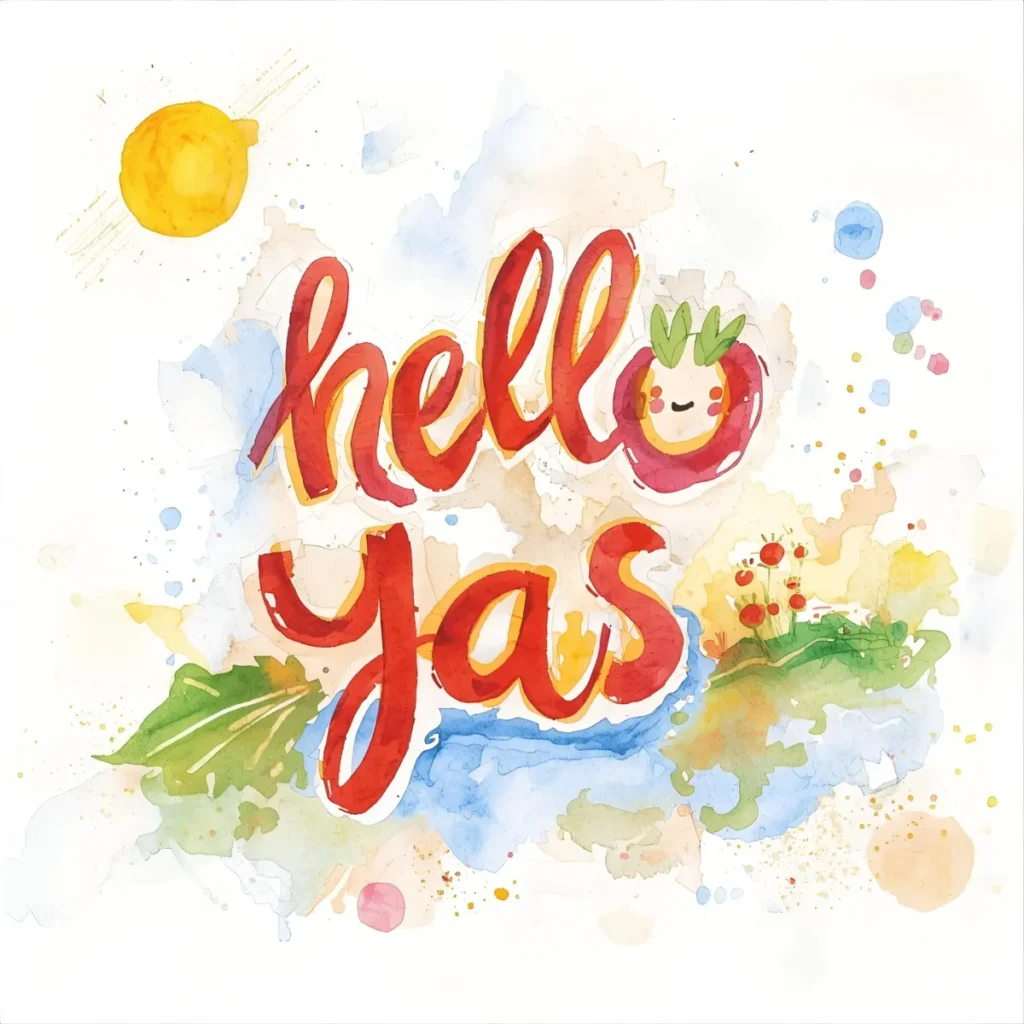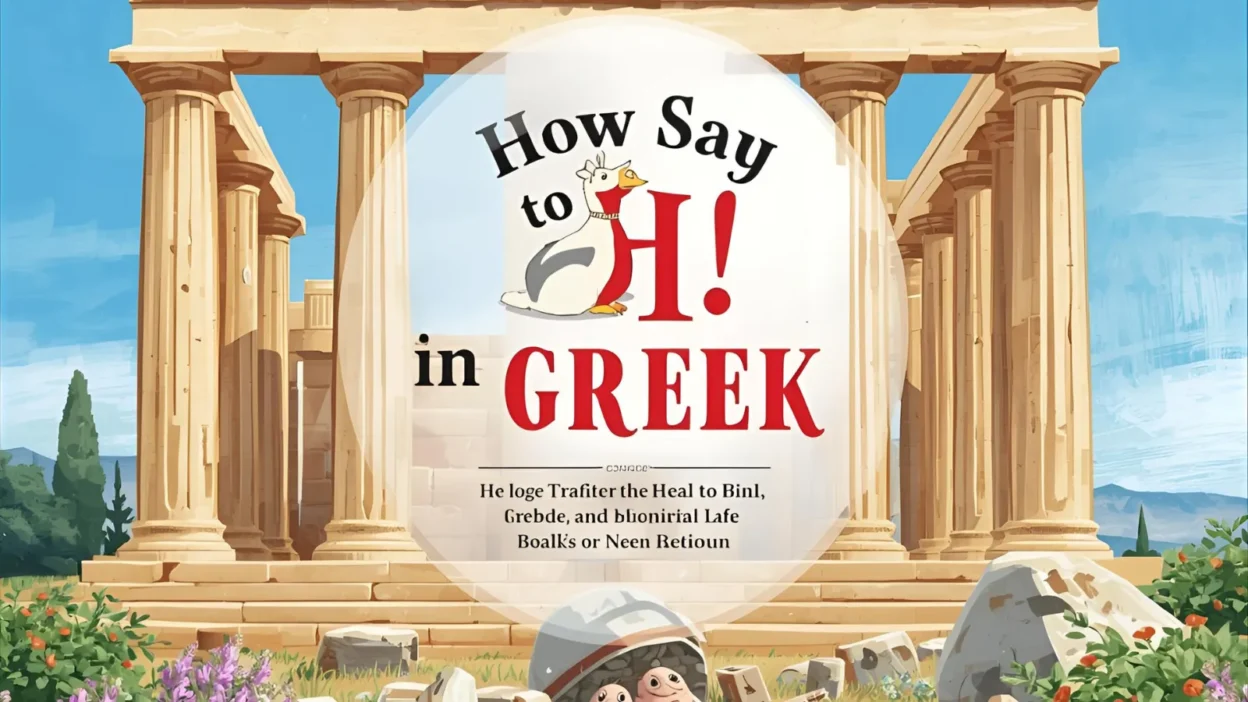Learning how to say hi in Greek is a simple yet meaningful way to connect with locals and experience the warmth of Greek culture. While “hi” may seem like a casual greeting, Greek offers several variations depending on the time of day and the level of formality.
Whether you’re visiting Greece, meeting new people, or exploring the language, knowing the right greeting will help you start conversations naturally and respectfully.
Say Hi in Greek
Here’s a 15-phrases table for different ways to say Hi in Greek with English meaning, Greek writing, and pronunciation:
15 phrases table for How to Say Hi in Greek
| # | English Phrase | Greek Phrase | Pronunciation |
|---|---|---|---|
| 1 | Hi | Γειά | Ya |
| 2 | Hello | Γειά σου | Ya sou |
| 3 | Hello (formal) | Γειά σας | Ya sas |
| 4 | Hi there! | Χαίρετε | Herete |
| 5 | Good morning | Καλημέρα | Kaliméra |
| 6 | Good afternoon | Καλό απόγευμα | Kaló apógevma |
| 7 | Good evening | Καλησπέρα | Kalispéra |
| 8 | Good night | Καληνύχτα | Kaliníhta |
| 9 | Hey! | Έι! | Ei! |
| 10 | Hi friend! | Γεια σου φίλε | Ya sou fíle |
| 11 | Hi everyone! | Γεια σας όλοι | Ya sas óli |
| 12 | What’s up? (casual) | Τι κάνεις; | Ti kánis? |
| 13 | How are you? | Πώς είσαι; | Pôs íse? |
| 14 | Long time no see | Καιρό έχουμε να τα πούμε | Keró échoume na ta poúme |
| 15 | Welcome (hi to greet someone) | Καλώς ήρθες | Kalós írthes |
Let’s explore 15 different ways to say hi in Greek, with example conversations and fascinating origins or cultural notes for each!
1. Γειά σου (Ya sou) — “Hi” (informal)
Origin:
Literally means “your health.” It’s the most common casual way to say “hi” to someone you know well or someone your age.
Example:
👤 User A: Γειά σου, Μαρία!
👤 User B: Γειά σου, Νίκο! Τι κάνεις;
Use: To one person, informal/friendly setting.
2. Γειά σας (Ya sas) — “Hello” (formal or plural)

Origin:
Also means “your health” but used in polite or plural situations. It’s respectful and safe to use with strangers or elders.
Example:
👤 User A: Γειά σας, κύριε Παπαδόπουλε.
👤 User B: Γειά σας! Πώς είστε;
Use: Formal, or when addressing more than one person.
3. Χαίρετε (Cherete) — “Greetings” or “Hello”
Origin:
Derived from the word “χαρά” (joy), it’s a slightly formal and respectful greeting used by older generations or in official contexts.
Example:
👤 User A: Χαίρετε! Μπορώ να σας βοηθήσω;
👤 User B: Χαίρετε! Ψάχνω το μουσείο.
Use: Formal, polite, often in service or business situations.
4. Καλημέρα (Kaliméra) — “Good morning”
Origin:
From “καλός” (good) + “ημέρα” (day). Used until around noon.
Example:
👤 User A: Καλημέρα, Σοφία!
👤 User B: Καλημέρα, Κώστα! Κοιμήθηκες καλά;
Use: Friendly or formal, great for mornings.
5. Καλησπέρα (Kalispéra) — “Good evening”
Origin:
“Καλός” (good) + “σπέρα” (evening). Used from late afternoon onward.
Example:
👤 User A: Καλησπέρα σας!
👤 User B: Καλησπέρα! Περάστε.
Use: Formal or informal; used after 5 PM.
6. Καληνύχτα (Kaliníkhta) — “Good night”
Origin:
Used when leaving or saying goodbye at night. Literally means “good night.”
Example:
👤 User A: Καληνύχτα, φίλε μου.
👤 User B: Καληνύχτα! Τα λέμε αύριο.
Use: Used at night before parting or going to sleep.
7. Τι κάνεις; (Ti káneis?) — “How are you?” / “Hi, how’s it going?”

Origin:
Literally “What are you doing?” Common casual greeting among friends.
Example:
👤 User A: Γειά σου! Τι κάνεις;
👤 User B: Όλα καλά, εσύ;
Use: Informal; used after or instead of “hi.”
8. Τι γίνεται; (Ti gínetai?) — “What’s happening?”
Origin:
Means “What’s going on?” Used like “What’s up?” in English.
Example:
👤 User A: Τι γίνεται, φίλε;
👤 User B: Χαλαρά! Εσύ;
Use: Casual and conversational.
9. Έλα (Éla) — “Come” or “Hey!”

Origin:
Literally “come,” but commonly used to casually say “hey” or to grab attention.
Example:
👤 User A: Έλα ρε! Πού είσαι;
👤 User B: Εδώ είμαι! Έρχομαι τώρα.
Use: Very informal; often between close friends.
10. Όλα καλά; (Óla kalá?) — “All good?”
Origin:
Short for “Are things good with you?” A breezy, informal greeting.
Example:
👤 User A: Όλα καλά, Γιώργο;
👤 User B: Ναι, όλα τέλεια! Εσύ;
Use: Informal, often paired with a smile or handshake.
11. Πώς πάει; (Pos páei?) — “How’s it going?”
Origin:
Directly translates to “How is it going?” Similar to casual English greetings.
Example:
👤 User A: Πώς πάει;
👤 User B: Καλά! Εσύ;
Use: Informal, great for everyday use.
12. Yo (Γιο) — “Yo”
Origin:
Adopted from English youth slang, used mainly by teens and young adults in modern urban Greek.
Example:
👤 User A: Yo, τι λέει;
👤 User B: Yo! Όλα οκ!
Use: Very informal and playful.
13. Καλώς τον/την! (Kalós ton/tin!) — “Welcome!”
Origin:
Means “Here comes the man/woman!” Used when someone arrives, often cheerfully.
Example:
👤 User A: Καλώς τον φίλο μου!
👤 User B: Γεια σου, αδερφέ!
Use: Informal, warm greeting upon someone’s arrival.
14. Μέρα (Méra) — “Day” (slangy, short)
Origin:
A clipped version of “Καλημέρα,” used jokingly or very casually.
Example:
👤 User A: Μέρα! Τι νέα;
👤 User B: Καλά, εσύ;
Use: Informal, mostly among young Greeks.
15. Άντε γεια! (Ánte geia!) — “Bye!” (used like “Peace out”)
Origin:
Technically means “Go, bye!” but in modern Greek it can be playful or even cheeky.
Example:
👤 User A: Τελείωσα για σήμερα. Άντε γεια!
👤 User B: Άντε γεια, τα λέμε αύριο!
Use: Casual and humorous; sometimes used as a playful sign-off.
FAQs
1. What is the most common way to say hi in Greek?
The most common greeting is “Γεια σου” (Ya sou) for one person.
2. How do I say hi politely to older people or strangers?
Say “Γεια σας” (Ya sas) — it’s the polite or plural form.
3. Can I just say “Hello” in English in Greece?
Yes! Most Greeks understand “Hello,” especially in tourist areas.
4. How do you say hi to a group?
Use “Γεια σας” (Ya sas) to greet more than one person.
5. How do I say Good morning in Greek?
Say “Καλημέρα” (Kaliméra) — used until noon.
6. How do I say Good evening?
Say “Καλησπέρα” (Kalispéra) — used in the late afternoon and evening.
7. How do I say Good night?
Say “Καληνύχτα” (Kaliníkhta) — used before going to sleep.
8. Is there a casual “Hey” in Greek?
Yes — “Γεια” (Ya) works like “Hey” and is friendly and short.
9. How do I ask “How are you?” after greeting?
Say “Τι κάνεις;” (Ti káneis?) — meaning How are you?
10. Do Greeks use hugs or handshakes when greeting?
Yes — handshakes for formal situations, and hugs/kisses for close friends and family.
Conclusion:
Understanding how to say hi in Greek helps you create a friendly first impression and connect more deeply with Greek speakers.
From casual hellos to polite greetings, learning these simple phrases will make your conversations smoother and more authentic.

Sophia Mitchell is a passionate content writer known for creating clear, engaging, and informative articles.
She focuses on delivering well-structured content that is easy for readers to understand and trust.
Sophia Mitchell currently contributes quality writing to repliesnest.com, helping readers find accurate answers quickly.



